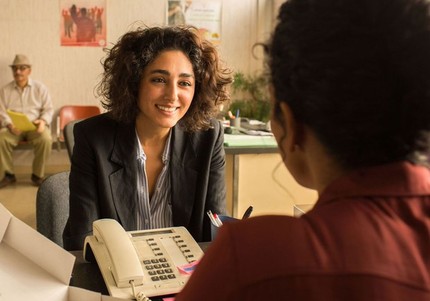Miami 2020 Review: ARAB BLUES, Cultures Clash in Modern Tunisia

For many first-generation immigrants, or those taken to another country at a young age, the place they could call 'home' is often difficult (not least if you're a person of colour raised in a predominantly white culture). Do you continue to stay in your adopted country, where even your privilege comes with discrimination and difficulty? Or do you return to your parents' country of origin, and be seen as an outsider in the place that should welcome you? How do you handle the cultural differences, and can you ease into a life?
Such clashes are ripe fodder for comedic cinema, and Arab Blues, Tunisian director Manele Ladibi's debut feature, plays them up in a film that blends cultural specificity with universally understandable frustrations. While not discounting some serious issues, the story stays on the lighter side of adjusting to a place that it at once familiar and foreign.
Selma (Golshifteh Farahani) moved to Paris with her family when she was 10. Now trained as a psychoanalyst, and frustrated with the sheer number of people in the same business in France, she decided to try her luck in her native Tunis. In post-Arab Spring Tunisia, there have been a lot of improvements, but Selma still encounters numerous problems as she navigates a hurdle-ridden bureaucratic system, not to mention patients who don't quite understand her practice.
She rents an apartment on the roof of her cousins' home, where there are already family squabbles (her young cousin Olfa (Aicha Ben Miled) wears a headscarf to hide her dyed hair and gets engaged in order to get out of the country); she sets up her practice only to find out she needs a licence, which means dealing with a bureaucratic system that moves as slow as molasses and needs constant monetary input; her clients, who are more used to just talking to their friends, have to learn about the limitations of psychotherapy; she's sold a car that's more of a run-down delivery vehicle that a self-employed doctor would drive; and there is a police officer who is both threatening to shut down her practice, and trying to date her.
Having lived in Paris for most of her life, Selma is used to a certain level of functionality, a certain social distance from her neighbours, not being harassed by police. She is an outsider in her home, and the adjustment ends up being more difficult for her than others. She is used to her solitude an independence, somewhat difficult in a country where women are still more expected than not to get married and have children; and yet, once they realize the benefit of her practice, her clients flock to her.
The situational comedy is deceptively complex: for Selma, it's not just about navigating the system, but also navigating this new life, and trying to find a way both to fit in and maintain her identity. Her encounters with some of her patients - a haridresser who has problems with her mother, a baker who is trying to navigate his queer identity, a former prisoner with PTSD - reflect her own struggles. Her determination wavers even as she finally seems to be acheiving her dreams, and she knows some compromise and adaptation will be necessary, even as she is slowly embraced by her community.
Labidi keeps a deft hand at the wheel, keeping the comedy relatable and effective, while letting us peak behind the curtains to see the difficulties underneath. Arab Blues is a window onto Tunisian humour, while relatable for anyone who has tried to come home again.
Arab Blues
Director(s)
- Manele Labidi
Writer(s)
- Maud Ameline (collaboration)
- Manele Labidi (screenplay)
Cast
- Golshifteh Farahani
- Majd Mastoura
- Aïsha Ben Miled
- Feryel Chammari







